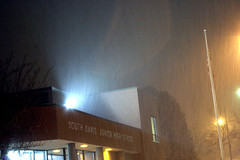 Beacons of waste. Image by makelessnoise via Flickr
Beacons of waste. Image by makelessnoise via Flickr
The old-fashioned streetlight is the recession's latest victim. To save money, some cities and towns are turning off lights, often lots of them.
The cost-cutting moves coincide with changing attitudes about streetlights. Once viewed as helpful safety measures, the lights are increasingly seen by some public officials and researchers as an environmental issue, creating light pollution and burning excess energy. . . .
In July, Santa Rosa, Calif., started a two-year effort to remove 6,000 of the city's 15,000 streetlights. An additional 3,000 will be placed on a timer that shuts lights off from midnight to 5:30 a.m. Savings: $400,000 a year.
The city boasts that it will cut its carbon footprint. What really matters, though, is money.
Public works director Rick Moshier says he'd already cut his department's budget by 25% when he turned to streetlights. "I can either fix potholes and storm drains or keep paying $800,000 a year for electricity," Moshier says. . . .
There's little evidence to support the belief that streetlights reduce crime, he says. However, lighting does reduce traffic accidents, especially at intersections.
The nation's streetlights consume electricity equivalent to 1.4 million homes. They generate greenhouse gases equal to 2 million cars a year.

![Reblog this post [with Zemanta]](http://img.zemanta.com/reblog_e.png?x-id=33020e82-9b4f-4777-8738-44d9a8804432)




3 comments:
Street lighting is good, however, for making it easier and safer to bike at night. Eliminating street lighting would really diminish the bike as an option for winter commuting and night time travel.
All state buildings on the Capitol Mall are going dark at night, beginning in September, I believe, with the exception of limited emergency lighting. State employees burning the midnight oil (as some actually do, contrary to the stereotypes) are being told they will need to use the task lights on their desks. It's going to save a lot of dough. Let's see if we get any credit for it. Probably not.
Good thing there are options in between our current attempts to replicate daylight at 3 a.m. and "eliminating" streetlights! One can imagine smart lighting that uses motion sensors, reducing the number of lights by half, leaving lights on primarily arterials and not in neighborhoods, equipping bikes with good LED headlights, etc.
Post a Comment